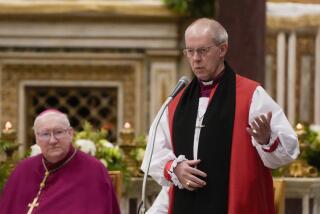Church Leaders Announce Anti-Apartheid Campaign
- Share via
WASHINGTON — The leaders of seven denominations have announced a joint campaign to mobilize their national memberships in support a variety of anti-apartheid measures, including comprehensive U.S. sanctions against South Africa.
The initiative was devised at a summit of leaders of black church groups here Tuesday and Wednesday. The denominations represented at the meeting--the African Methodist Episcopal Church, AME Zion Church, Christian Methodist Episcopal Church, Church of God in Christ, National Baptist Convention of America, National Baptist Convention U.S.A. and the Progressive National Baptist Convention--have a combined membership of 19 million.
“The intensifying brutality of the Pretoria regime--death and detention of children, attacks against the churches and church leaders--and the war against South Africa’s neighbors compel us to speak out as one united voice for an end to the pain being inflicted upon our sisters and brothers,” the leaders said in a closing statement.
The effort announced here originated in a September, 1987, challenge by the Rev. Alan Boesak, a leading South African anti-apartheid activist. In a speech to black church leaders in Atlanta, Boesak, a minister in the Dutch Reformed Church and president of the World Alliance of Reformed Churches, called on them to “exert every effort possible to bring an end to the long night of suffering by the people of South Africa.”
Overseas Visit
In September, a delegation of church leaders traveled to southern Africa to meet with South African church leaders and officials of other anti-apartheid groups, including the African National Congress. The discussions were carried on in neighboring countries because delegation members had been denied visas to enter South Africa.
The leaders vowed at the meeting to engage their memberships in actions that would support:
- Stronger U.S. economic sanctions against South Africa. In particular, they pledged support for a bill by Rep. Ronald V. Dellums (D-Berkeley) and Sen. Alan Cranston (D-California) that would impose further sanctions on South Africa.
- U.S. economic aid for the black-ruled states that border South Africa. The church leaders said South Africa has punished these nations economically and militarily for their opposition to apartheid.
- An end to U.S. backing for the South Africa-supported rebels trying to overthrow the government of Angola, which has had the aid of Cuban troops. The group also said it would seek a meeting with President-elect George Bush, who has assured Angolan rebel leader Jonas Savimbi of continued U.S. support.
- The international boycott of Shell Oil Co., which has clashed with anti-apartheid activists and churches over its activities in South Africa.
Boesak said at the meeting that U.S. sanctions against South Africa have been effective and that they played a role in South Africa’s recent decision to settle conflicts in Namibia and Angola. As part of the U.S.-brokered settlement, South Africa agreed to withdraw its forces from Namibia and to end its aid to Savimbi’s anticommunist rebels; Angola agreed to an evacuation of Cuban troops. Boesak also said the sanctions have helped cool South Africa’s economy, which has made it harder for the country to maintain its military campaigns.
The U.S. Congress imposed limited sanctions on South Africa in 1986. Last year, the House of Representatives approved a bill imposing further sanctions, but no such measure was considered in the Senate.
No Consensus on ANC
Bishop Ruben Speaks of the AME Zion Church said the church leaders reached no consensus on whether to back the African National Congress. The ANC, which has been banned in South Africa, has been accused of terrorism in its struggle against the South African government.
There were statements indicating sympathy with the ANC, however. “We do not agree with others who have called them terrorists and communists,” said the Rev. Mac Charles Jones of the National Baptist Convention of America.
More to Read
Sign up for Essential California
The most important California stories and recommendations in your inbox every morning.
You may occasionally receive promotional content from the Los Angeles Times.













